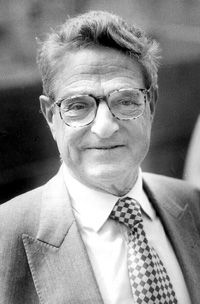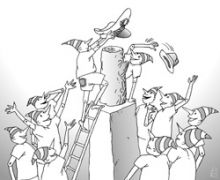The collapse of the Soviet empire in 1989 and the Soviet Union in 1991 offered a historic opportunity to transform that part of the world into open societies, but the Western democracies failed to rise to the occasion and the entire world has to suffer the consequences. The Soviet Union and later Russia needed outside help because an open society is a more sophisticated form of social organization than a closed society. In a closed society there is only one concept of how society should be organized, the authorized version, which is imposed by force. In an open society citizens are not only allowed but required to think for themselves, and there are institutional arrangements that allow people with different interests, different backgrounds, and different opinions to live together in peace.
The Soviet system was probably the most comprehensive form of closed society ever invented by man. It penetrated into practically all aspects of existence: not only the political and military but also the economic and the intellectual; at its most aggressive, it even tried to invade natural science, as the case of Lysenko showed. To make the transition to an open society required a revolutionary change in regime which could not be accomplished without outside help. It was this insight that prompted me to rush in and establish open society foundations in one country after another in the former Soviet empire.
But the open societies of the West lacked the insight. After the end of the Second World War, the United States launched the Marshall Plan; after the collapse of the Soviet system the idea of a similar initiative was unthinkable. I proposed something like it at a conference in the spring of 1989 in Potsdam, which was then still in East Germany, and I was literally laughed at. The laughter was led by William Waldegrave, a minister in Margaret Thatcher’s foreign office. Margaret Thatcher was a staunch defender of freedom, when she visited Communist countries she insisted on meeting with dissidents but the idea that an open society needs to be constructed and that the construction may require and deserve outside help was apparently beyond her understanding. As a market fundamentalist, she did not believe in government intervention. In fact, the formerly Communist countries were left largely to fend for themselves. Some made the grade; others did not.
There is much soul-searching and finger-pointing going on with regard to Russia. Articles are being written asking, Who lost Russia? I am convinced that we, the Western democracies, are largely responsible, and that sins of omission were committed by the Bush and Thatcher administrations. The record of Chancellor Kohl’s Germany is more mixed. Both in extending credits and in making grants, Germany was the largest financial contributor to the Soviet Union and later to Russia, but Kohl was motivated more by the desire to buy Russian acquiescence to German reunification than to help transform Russia.
I contend that if the Western democracies had really engaged themselves, Russia could have been firmly established on the road toward a market economy and an open society. I realize that my contention runs counter to prevailing views. It is counterfactual because, in fact, the economic reform efforts were dismal failures. One would have to believe in the efficacy of foreign aid to argue that the outcome could have been different; but foreign aid has a bad record and the idea that governmental intervention could actually help an economy goes against the prevailing market fundamentalist bias. So attention is concentrated on who did what that went wrong. But it is exactly the market fundamentalist bias that must be held responsible for the outcome. It militated against genuine engagement to help the Soviet Union and later Russia. There was genuine engagement on the part of the Kohl government to help East Germany, but that was motivated by the desire for reunification; there was no similar motive for helping the Soviet Union. People felt a lot of sympathy, but it was inchoate. The open societies of the West did not believe in the open society as a desirable goal whose pursuit would justify considerable effort. This was my greatest disappointment and misjudgment. I was misled by the rhetoric of the Cold War. The West was willing to support the transition with words but not with money, and whatever aid and advice was given was misguided by a market fundamentalist bias. The Soviets and later Russians were very eager for and receptive to outside advice. They realized that their own system was rotten, and they tended to idolize the West. They made the same mistake as I did: they thought the West was genuinely concerned.
I had set up a foundation in the Soviet Union as early as 1987. When Gorbachev phoned Sakharov in his exile in Gorki and asked him to “resume his patriotic activities in Moscow,” I realized that a revolutionary change was in the making. I have described my experiences elsewhere. (Underwriting Democracy {Free Press, Macmillan, 1991}). What is relevant here is that in 1988 I proposed setting up an international task force to study the creation of an “open sector” in the Soviet economy, and somewhat to my surprise — I was then an obscure fund manager — my proposal was accepted by officials in the USSR.
My idea was to create a market sector within the command economy, select an industry like food processing which would sell its products to consumers at market rather than command prices (with an appropriate system for transfer from command prices to market prices). This “open sector” could then be gradually enlarged. It soon became evident that the idea was impractical because the command economy was too diseased to nurture the embryo of a market economy. That is, the problem of transfer pricing could not be solved. But even such a harebrained idea from an insignificant source was supported at the highest level. Prime Minister Ryzhkov ordered the heads of the major institutions, Gosplan, Gosnab, and so on to participate. It is true that I was able to attract Western economists like Wassily Leontief and Romano Prodi to participate from the Western side.
Later on I put together a group of Western experts who provided advice to different groups of Russian economists preparing competing economic reform programs. Then I arranged for the authors of the principal Russian proposal for economic reform, the so-called Shatalin Plan, led by Grigory Yavlinsky, to be invited to the 1990 International Monetary Fund/World Bank meeting in Washington. Gorbachev wavered over the plan and finally decided against it. He balked at two issues: the privatization of land, and the simultaneous dissolution of the Soviet Union along with the formation of an economic union. I still think the Shatalin Plan would have provided for a more orderly transition than did the actual course of events.
Soon afterward, Gorbachev fell from power, the Soviet Union disintegrated, and Boris Yeltsin became President of Russia. He entrusted the economy to Yegor Gaidar, the head of an economic research institute who had studied macroeconomic theory from the standard textbook of Rudi Dornbusch and Stan Fischer. He tried to apply monetary policy to an economy that did not obey monetary signals. State-owned enterprises were continuing to produce according to plan even if they were not getting paid for it. I remember calling Gaidar in April 1992 to point out that debt between companies was rising at a rate which was equal to one third of the GNP. He acknowledged the problem but carried on regardless.
When Gaidar failed, an uneasy balancing act followed and eventually Anatoly Chubais, the head of another research institute, emerged as deputy prime minister in charge of the economy. He gave priority to the transfer of property from state to private hands. He believed that once state property had private owners, the owners would start protecting their property and the process of disintegration would be arrested.
That is not how it worked out. A scheme for distributing vouchers which citizens could use to purchase state-owned companies became a free-for-all aimed at expropriating the assets of the state. Management took control by cheating the workers out of their vouchers or buying up shares on the cheap. They continued to siphon off earnings and often assets into holding companies based in Cyprus, partly to avoid taxes, partly to pay for the shares they acquired, and partly to build up their assets abroad because they had no confidence in what was going on at home. Fortunes were made overnight, while there was also an extreme shortage of money and credit, both in rubles and in dollars.
(To be continued)








